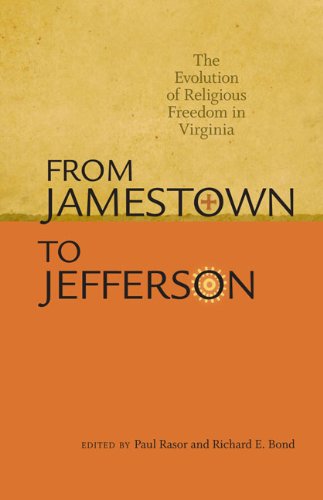

Most ebook files are in PDF format, so you can easily read them using various software such as Foxit Reader or directly on the Google Chrome browser.
Some ebook files are released by publishers in other formats such as .awz, .mobi, .epub, .fb2, etc. You may need to install specific software to read these formats on mobile/PC, such as Calibre.
Please read the tutorial at this link: https://ebookbell.com/faq
We offer FREE conversion to the popular formats you request; however, this may take some time. Therefore, right after payment, please email us, and we will try to provide the service as quickly as possible.
For some exceptional file formats or broken links (if any), please refrain from opening any disputes. Instead, email us first, and we will try to assist within a maximum of 6 hours.
EbookBell Team

4.0
26 reviewsFrom Jamestown to Jefferson sheds new light on the contexts surrounding Thomas Jefferson’s Statute for Religious Freedom—and on the emergence of the American understanding of religious freedom—by examining its deep roots in colonial Virginia’s remarkable religious diversity. Challenging traditional assumptions about life in early Virginia, the essays in this volume show that the colony was more religious, more diverse, and more tolerant than commonly supposed. The presence of groups as disparate as Quakers, African and African American slaves, and Presbyterians, alongside the established Anglicans, generated a dynamic tension between religious diversity and attempts at hegemonic authority that was apparent from Virginia’s earliest days. The contributors, all renowned scholars of Virginia history, treat in detail the complex interactions among Virginia’s varied religious groups, both in and out of power, as well as the seismic changes unleashed by the Statute’s adoption in 1786. From Jamestown to Jefferson suggests that the daily religious practices and struggles that took place in the town halls, backwoods settlements, plantation houses, and slave quarters that dotted the colonial Virginia landscape helped create a social and political space within which a new understanding of religious freedom, represented by Jefferson’s Statute, could emerge.
Contributors:Edward L. Bond, Alabama A&M University * Richard E. Bond, Virginia Wesleyan College * Thomas E. Buckley, Jesuit School of Theology of Santa Clara University/Graduate Theological Union * Daniel L. Dreisbach, American University, School of Public Affairs * Philip D. Morgan, Johns Hopkins University * Monica Najar, Lehigh University * Paul Rasor, Virginia Wesleyan College * Brent Tarter, Library of Virginia